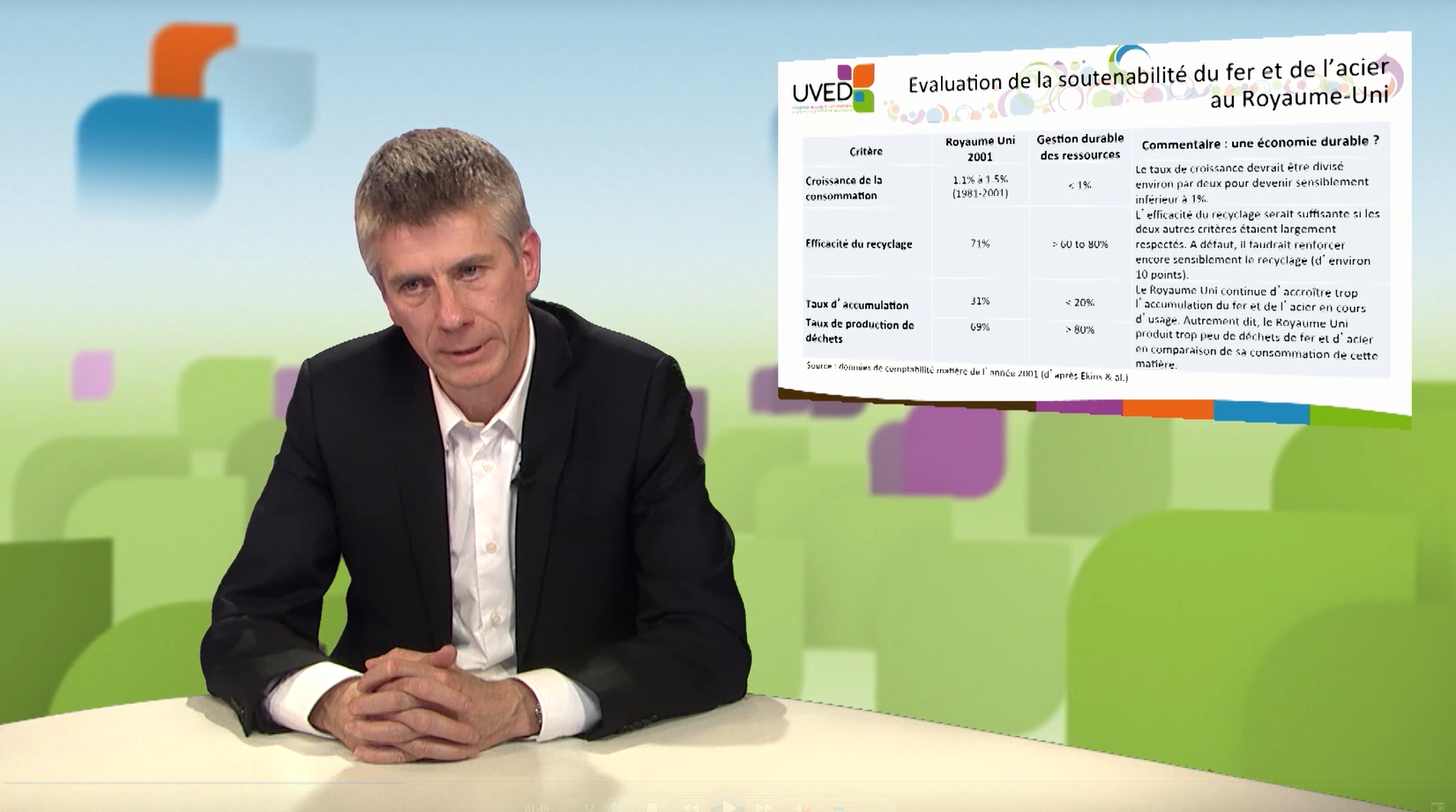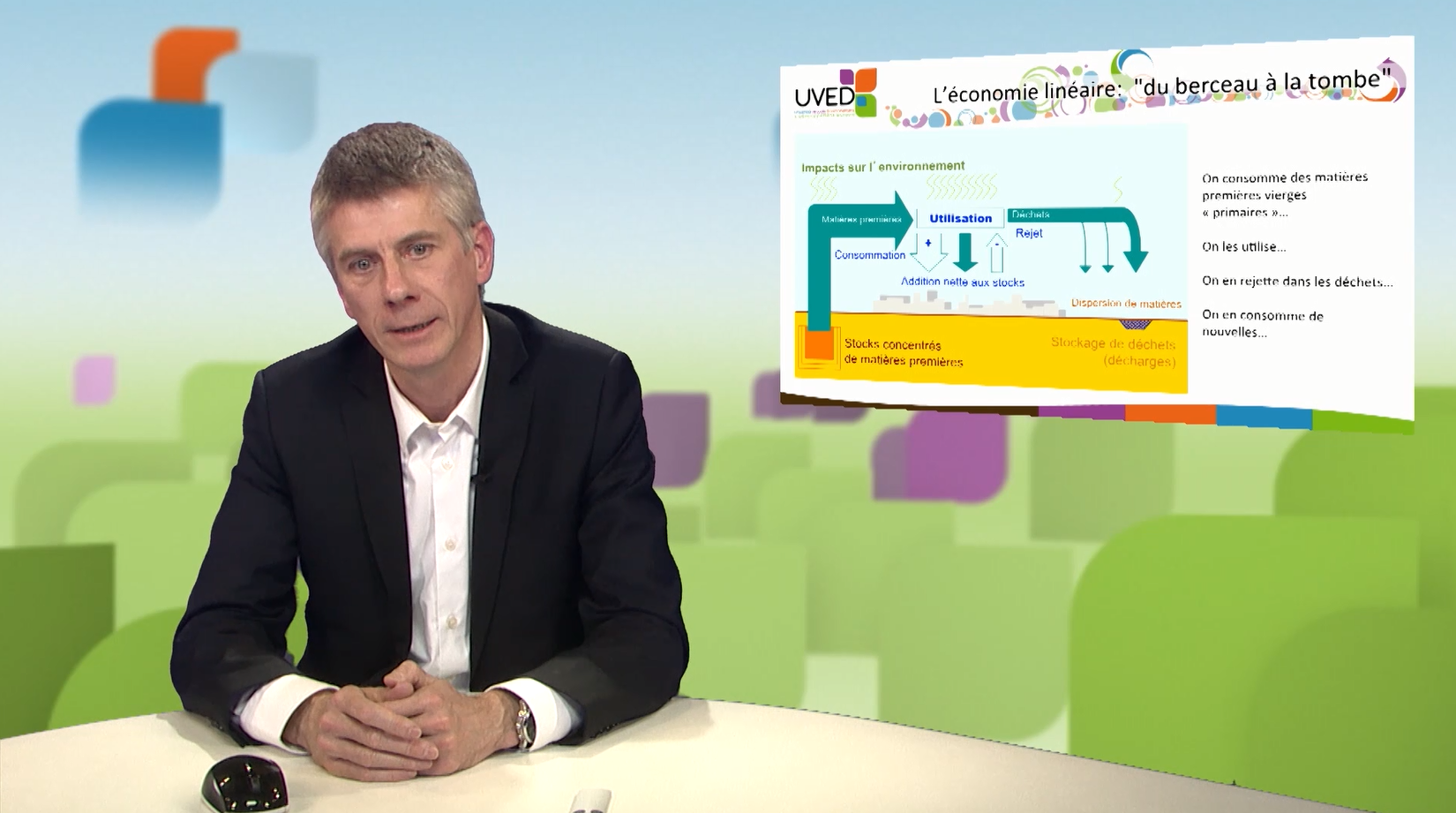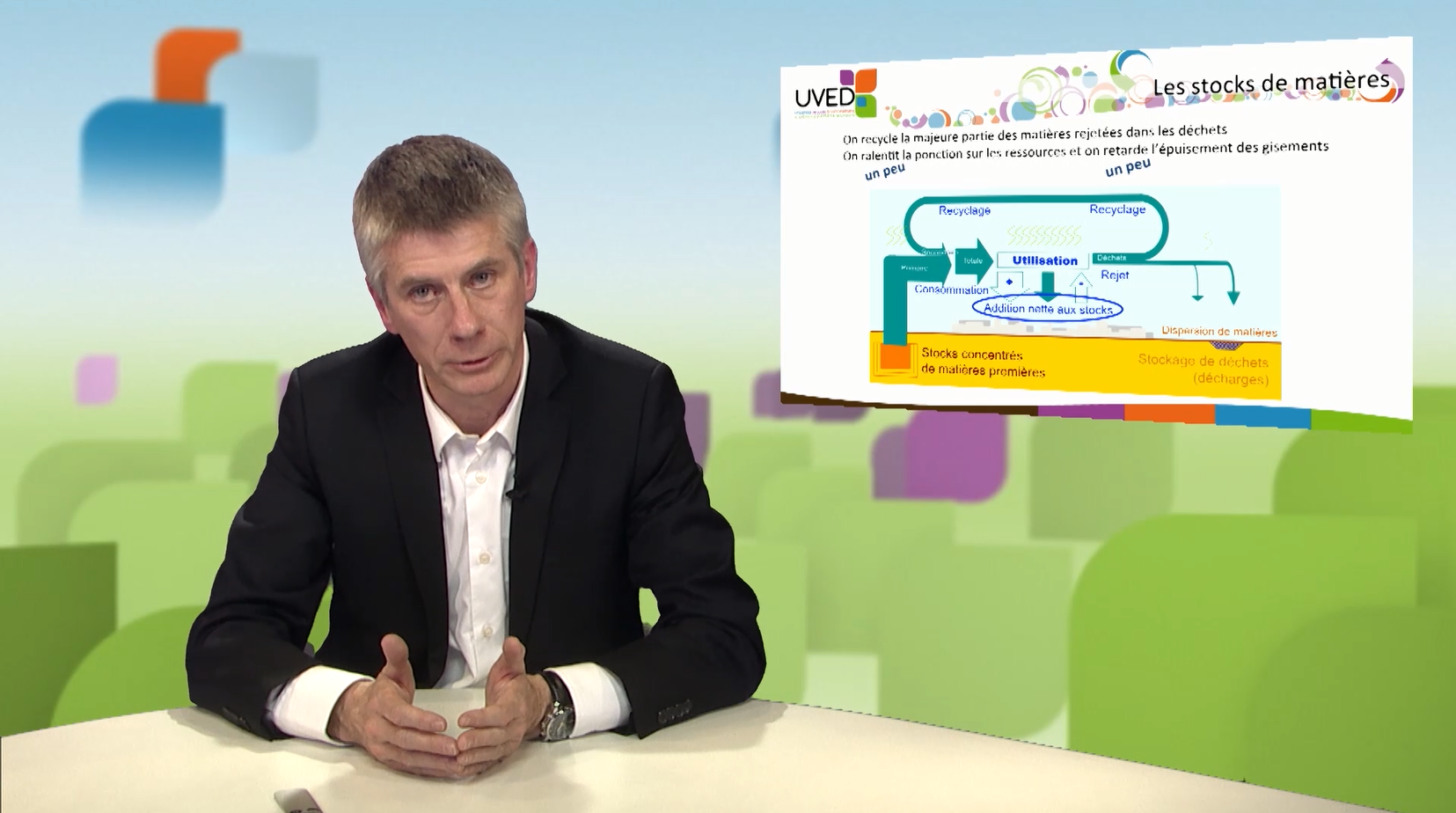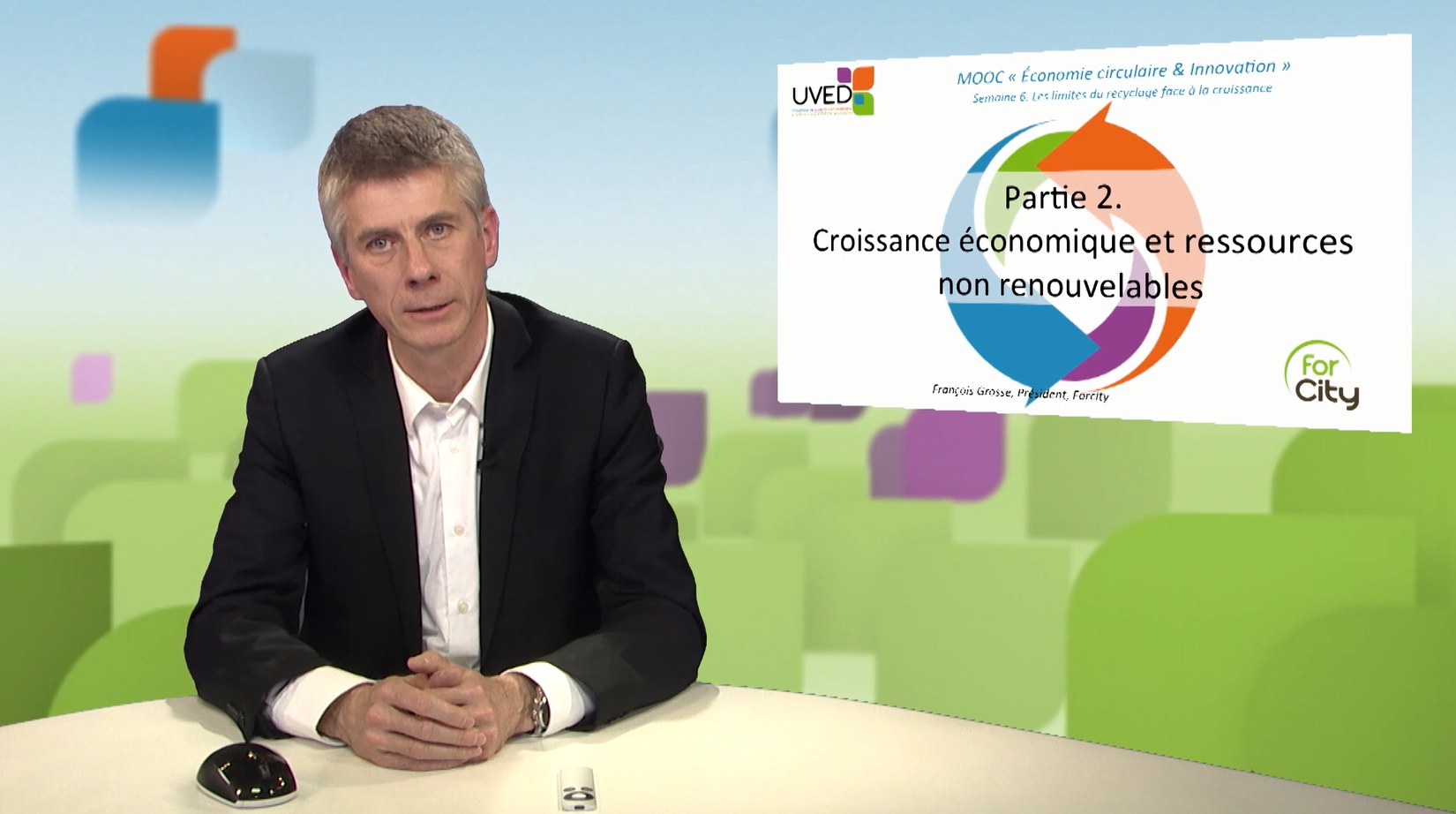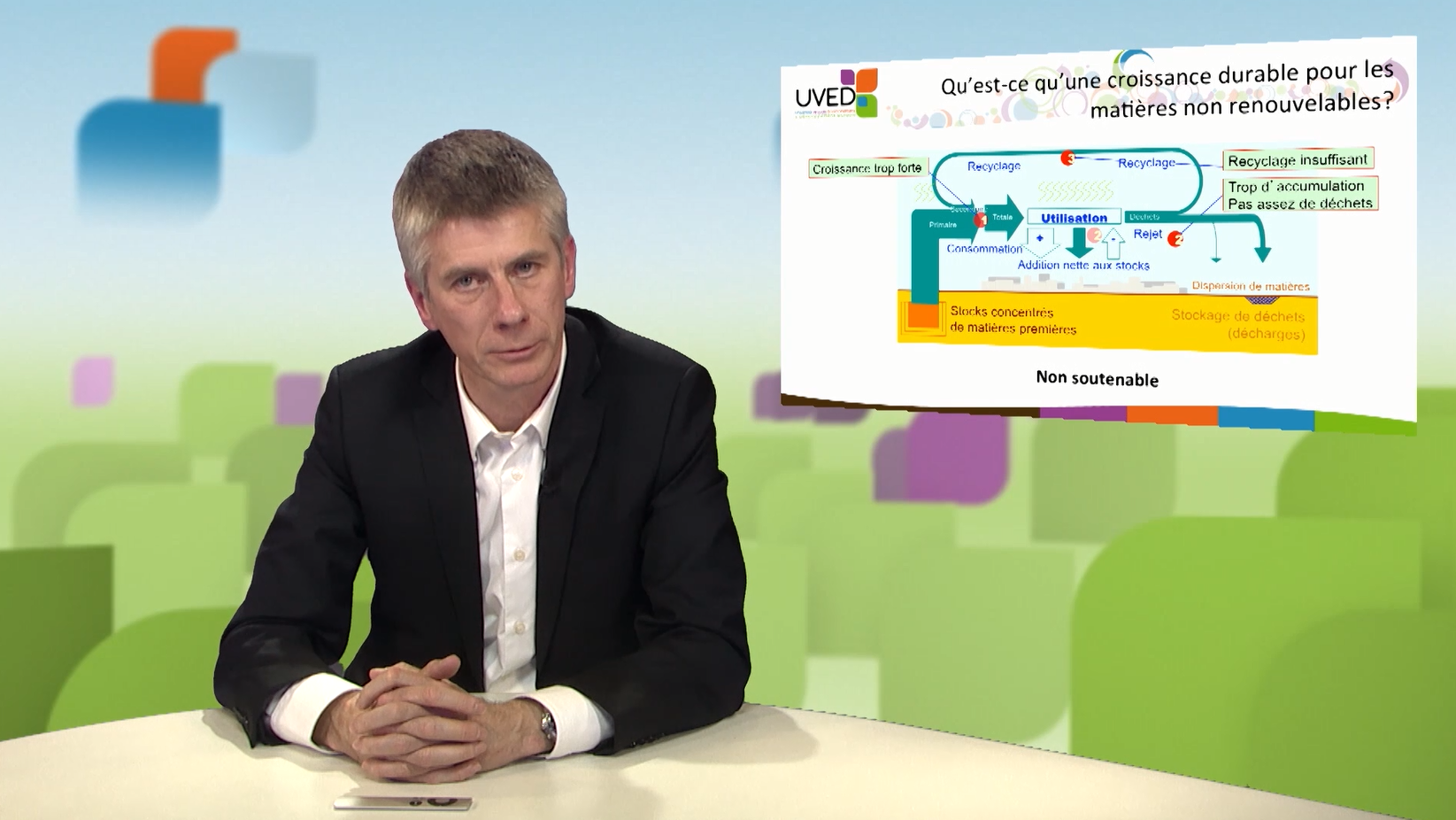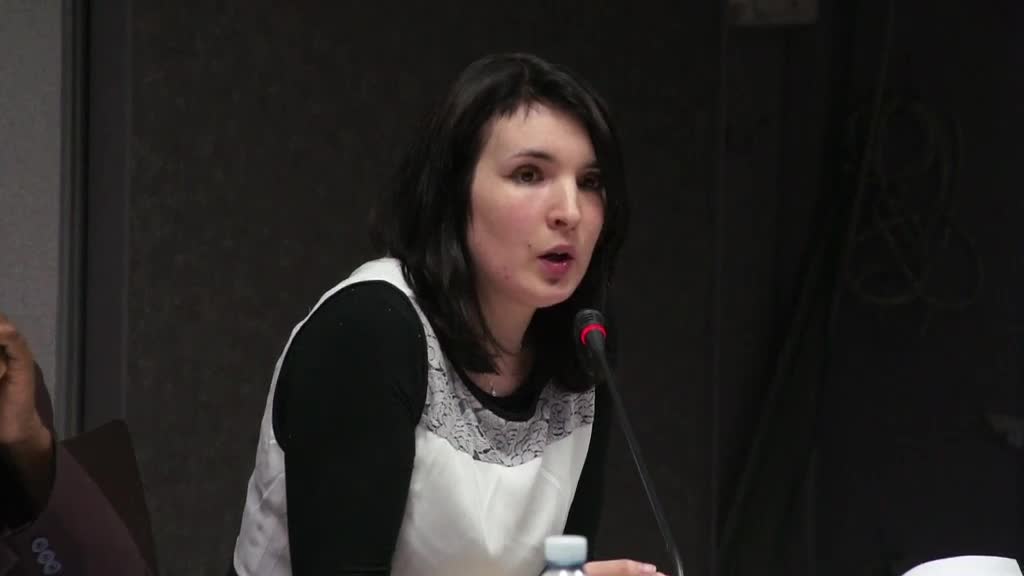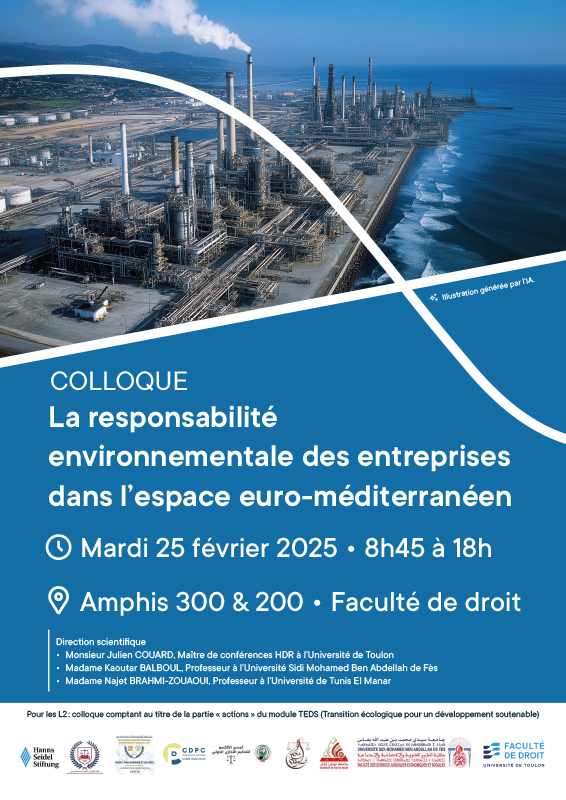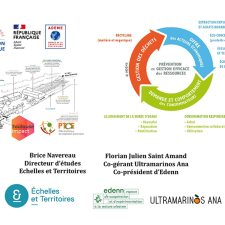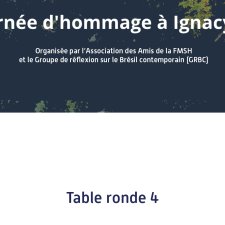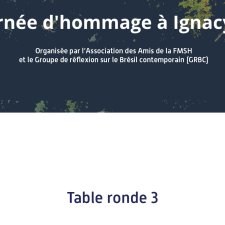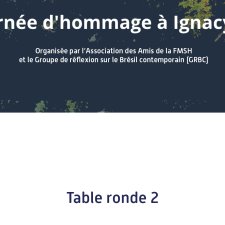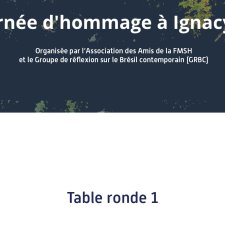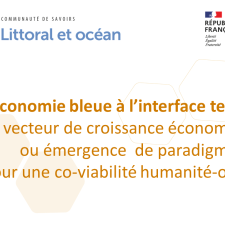Notice
The effects of the accumulation of materials
- document 1 document 2 document 3
- niveau 1 niveau 2 niveau 3
Descriptif
François Grosse, Co-founder and President of ForCity, analyzes the link between depletion of non-renewable resources, recycling, and the accumulation of non-renewable materials in the economy. He shows that to have an effect on the reduction of raw material, it is necessary that companies accumulate only a minimum of these materials, less than 20%.
Dans la même collection
-
An introduction to circular economy
GrosseFrançoisFrançois Grosse, Co-founder and President of ForCity, proposes a framework for the circular economy based on the flows of materials entering, storing, and leaving the industrial system. He raises the
-
Growth and the limitations of recycling : outlook
GrosseFrançoisFrançois Grosse, Co-founder and President of ForCity, discusses the three conditions that must be met in order to significantly reduce non-renewable resource withdrawals. He confronts them of the
-
Growth and the limitations of recycling : summary
GrosseFrançoisFrançois Grosse, Co-founder and President of ForCity, summarizes the three conditions that must be met in order to delay the depletion of non-renewable natural resources as much as possible: high
-
Economic growth and recycling of materials
GrosseFrançoisFrançois Grosse, Co-founder and President of ForCity, analyzes the impact of recycling on the consumption of raw materials in a growing economy. He shows that a high rate of recycling, can only delay
-
Non-renewable resources and economic growth
GrosseFrançoisFrançois Grosse, Co-founder and President of ForCity, discusses the major trends in our societies regarding the consumption of non-renewable materials. He stresses the need to take into account the
Avec les mêmes intervenants et intervenantes
-
Introducción a la economía circular
GrosseFrançoisEn este vídeo, François Grosse, fundador de la empresa ForCity, propone una definición general de la economía circular, en base a una representación que muestra, a escala de un sistema industrial,
-
Límites del reiclaje frente al crecimiento: síntesis
GrosseFrançoisEn este vídeo, François Grosse recapitula las tres condiciones que deben reunirse para retrasar todo lo posible el agotamiento de los recursos naturales no renovables: una elevada tasa de reciclaje,
-
An introduction to circular economy
GrosseFrançoisFrançois Grosse, Co-founder and President of ForCity, proposes a framework for the circular economy based on the flows of materials entering, storing, and leaving the industrial system. He raises the
-
Growth and the limitations of recycling : outlook
GrosseFrançoisFrançois Grosse, Co-founder and President of ForCity, discusses the three conditions that must be met in order to significantly reduce non-renewable resource withdrawals. He confronts them of the
-
Growth and the limitations of recycling : summary
GrosseFrançoisFrançois Grosse, Co-founder and President of ForCity, summarizes the three conditions that must be met in order to delay the depletion of non-renewable natural resources as much as possible: high
-
Economic growth and recycling of materials
GrosseFrançoisFrançois Grosse, Co-founder and President of ForCity, analyzes the impact of recycling on the consumption of raw materials in a growing economy. He shows that a high rate of recycling, can only delay
-
Non-renewable resources and economic growth
GrosseFrançoisFrançois Grosse, Co-founder and President of ForCity, discusses the major trends in our societies regarding the consumption of non-renewable materials. He stresses the need to take into account the
-
Les limites du recyclage face à la croissance : perspectives
GrosseFrançoisFrançois Grosse (ForCity) revient sur les trois conditions qui doivent être réunies afin de réduire de manière significative les prélèvements de ressources non renouvelables. Il les confronte pour
-
Introduction à l'économie circulaire
GrosseFrançoisFrançois Grosse (ForCity) propose un cadrage de l'économie circulaire en s'appuyant sur les flux de matières qui entrent, se stockent, et sortent du système industriel. Il pose la problématique de la
-
Effets de l'accumulation des matières
GrosseFrançoisFrançois Grosse (ForCity) analyse le lien entre épuisement des ressources non renouvelables, recyclage, et accumulation de matières non renouvelables dans l'économie. Il montre que pour que le
-
Ressources non renouvelables et croissance économique
GrosseFrançoisFrançois Grosse (ForCity) revient sur les grandes tendances de nos sociétés en matière de consommation de matières non renouvelables. Il souligne la nécessité de prendre en compte la croissance
-
Les limites du recyclage face à la croissance : synthèse
GrosseFrançoisFrançois Grosse (ForCity) récapitule les trois conditions qu'il est nécessaire de réunir pour retarder le plus possible l'épuisement des ressources naturelles non renouvelables : un fort taux de
Sur le même thème
-
25 - Atelier 5.4 "L'habitat durable : une mise en oeuvre du développement durable"
SabatierAnne-LouiseColloque de clôture du Programme de recherche bi-disciplinaire (Sociologie et Droit), financé par l’Agence Nationale de la Recherche (Espace et territoire 2010), ALTER-PROP « Partages des espaces
-
Conclusions - Colloque " La responsabilité environnementale des entreprises dans l'espace euro-méd…
RichardPascalMardi 25 février 2025 • Faculté de droit • Université de Toulon
-
L'approche du droit de la transition énergétique au Maroc : quelle influence sur le développement d…
Mardi 25 février 2025 • Faculté de droit • Université de Toulon Bouthayna Charaf, étudiante en Master 2 Juriste d'affaires, FSJES-Fès, USMBA-Fès
-
Parties prenantes et responsabilité environnementale: quel rôle dans le renforcement du développeme…
Mardi 25 février 2025 • Faculté de droit • Université de Toulon Parties prenantes et responsabilité environnementale: quel rôle dans le renforcement du développement durable au Maroc Youssef
-
Le développement durable face aux enjeux antinomiques de la responsabilité environnementale des ent…
Mardi 25 février 2025 • Faculté de droit • Université de Toulon Kaoutar Balboul, Maître de conférences habilité à la FSJES-Fès, USMBA-Fès
-
L'économie circulaire, la transition en action dans les territoires métropolitains
NavereauBriceJulien Saint AmandFlorianEn réponse aux défis imposés par les exigences du développement durable, les territoires s’engagent dans les transitions et l’économie circulaire. Cette conférence proposait un double éclairage sur
-
Échange avec un grand témoin Krzysztof Pomian à la journée d'hommage en l'honneur d'Ignacy Sachs
PomianKrzysztofVinaverKrystynaÉchange avec un grand témoin Krzysztof Pomian, directeur de recherche émérite CNRS et Krystyna Vinaver...
-
Table ronde 4 | Brésil, quo vadis ?
ThéryHervéBuarqueCristovamMaimon SchirayDaliaPinheiroPaulo SérgioAbramovayRicardoLeiteSérgio PereiraFonsecaClaudia DamascenoDaherMarceloRendre hommage à Ignacy Sachs (1927-2023), c’est saluer le parcours visionnaire du théoricien de l’écodéveloppement qui, dès les années 1970, pose les bases d’un équilibre à atteindre entre croissance
-
Table ronde 3 | État, planification, marché, mondialisation
LecocqFranckPereiraLuÍz Carlos BresserDowborLadislauNayyarDeepakSagastiFranciscoAguiarRosa Freire d'CardettiniOneliaRendre hommage à Ignacy Sachs (1927-2023), c’est saluer le parcours visionnaire du théoricien de l’écodéveloppement qui, dès les années 1970, pose les bases d’un équilibre à atteindre entre croissance
-
Table ronde 2 | Économie et histoire : le comparatisme de la découverte du Tiers monde aux BRICS
RacineJean-LucAymardMauriceChavanceBernardKulaMarcinSaglio-YatzimirskyMarie-CarolineMazurekMałgorzataRendre hommage à Ignacy Sachs (1927-2023), c’est saluer le parcours visionnaire du théoricien de l’écodéveloppement qui, dès les années 1970, pose les bases d’un équilibre à atteindre entre croissance
-
Accueil et table ronde 1 | Croissance et régulation économique et sociale, écodéveloppement
RacineJean-LucCohenAntoninAymardMauricePottierAntoninBoyerRobertHourcadeJean-CharlesLa RovereEmilio LèbreGarciaAfrânioRivronVassiliRendre hommage à Ignacy Sachs (1927-2023), c’est saluer le parcours visionnaire du théoricien de l’écodéveloppement qui, dès les années 1970, pose les bases d’un équilibre à atteindre entre croissance
-
L’économie bleue à l’interface terre-mer- CoSavez-vous ? Littoral et Océan
BeckensteinerJenniferDavidGilbertDuvailStéphanieKertousMouradLecuyerOskarL’économie bleue à l’interface terre-mer : vecteur de croissance économique ou émergence de paradigmes pour une co-viabilité humanité-océans ?










